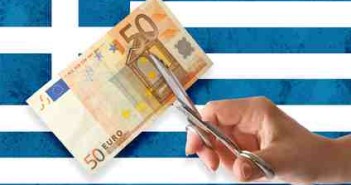Greece is where the debt crisis all began. After a long period in the shadows, the nation in the south east of the euro-zone is seeing new trouble.
A mix of political issues and some optimism that the country can walk on its own can brew into a clash with the rest of the European Union.
The latest opinion polls have shown that opposition leftist anti-bailout party SYRIZA has a clear lead over the ruling center-right party of New Democracy. It’s important to note that the party that wins the elections gets an additional 50 seats in the 300 seat parliament. This system of “reinforced” majority can result in an absolute majority for policies that are not comfortable for the European Union and the euro zone.
Here is a quote from the poll:
According to the poll, SYRIZA gathers 26.7 percent, New Democracy 20.2, To Potami 6, Golden Dawn 5.7, the Communist Party 5.7, PASOK 4 percent, Independent Greeks 3 percent, LAOS 2.1, ANTARSYA 1.6.
This poll is not detached from political reality: SYRIZA came on top in the recent European Parliament elections, beating the mainstream center right and center left parties.
The next political crisis could emerge from the selection of a new president. Members of Parliament are due to elect a new president in February. The coalition led by Prime Minister Antonis Samaras of New Democracy has a dwindling majority and any disagreement over this seemingly not-so-significant topic could result in a dissolution of parliament and new elections.
Economic woes but a primary surplus
The Greek economy is still shrinking, and unemployment is still at sky high levels. However, there are some signs of improvement in the unemployment front.
But more importantly, Greece may be able to walk alone, and not depend on external help, if it decides to break the chains. The country posted a primary surplus of 2.5 billion euros between January and September, beating estimates and well on track to beat the IMF forecasts for a surplus of 1.5 billion in 2014.
A primary surplus means that the Greek government can continue running without external help, and that the deficit is the result of repaying its still huge debt pile. In an extreme scenario, Greece could stop paying its debt and continue functioning. This is very theoretic and definitely not the path that Alexis Tsipras of SYRIZA or other leaders would opt for, as it would wreck havoc.
However, it does improve the country’s bargaining position when it comes to the endless meetings and reviews from the “troika” – the European Commission, the ECB and the IMF. This is especially relevant if a third Greek bailout becomes necessary. Greece could fight for a better bailout and perhaps more debt restructuring.
Higher bond yields
Chances of a less cooperative government combined with better bargaining power means worries in the markets.
Greek 10 year bond yields have topped 7%, a rise of around 30 basis points, before sliding back below this round number, considered the “bailout barrier” during the peak of the debt crisis. This is the highest since March.
The rise in yields comes in stark contrast to the global trend, including that in Europe and in peripheral countries such as Spain, where yields are lower than US ones.
Will fluctuations in Greek bond yields remain a background story in the bigger scheme of European issues? Or will Greece storm back to the headlines this winter?
More: Despite significant cuts to forecasts, Germany still seems very optimistic
